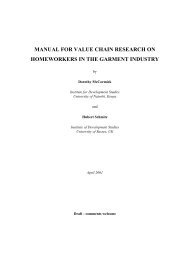OECD Culture and Local Development.pdf - PACA
OECD Culture and Local Development.pdf - PACA
OECD Culture and Local Development.pdf - PACA
You also want an ePaper? Increase the reach of your titles
YUMPU automatically turns print PDFs into web optimized ePapers that Google loves.
2. LOCAL DEVELOPMENT BASED ON ATTRACTING VISITORS AND TOURISTS<br />
The decrease from 2000-2001 (-4.6% in inflation-adjusted terms) was due almost<br />
entirely to the drop of tourists to New York City after September 11. There was in fact<br />
a 45.7% increase from the 1998-1999 season.<br />
- In Great Britain, recent studies have pointed to comparable results for London,<br />
but they also cover the impact of theatres located outside London (Travers,<br />
2004). The 1998 Wyndham report restricted its analysis to the impact of the<br />
theatres in London’s West End, <strong>and</strong> then in 2001 the Arts Council commissioned<br />
a report on the overall economic impact of the theatre industry in Great<br />
Britain, distinguishing between the London theatres <strong>and</strong> others. This latter<br />
study also defines the notions of economic impact <strong>and</strong> different methods for<br />
calculating it, <strong>and</strong> offers a detailed analysis of three theatres representing distinct<br />
categories.<br />
According to the first study, the economic impact of West End theatres can be<br />
estimated at £1.075 billion in 1997, broken down as follows: £433 million in spending<br />
by spectators (restaurants, hotels, transportation, miscellaneous purchases), £200<br />
million in tax revenues, <strong>and</strong> a £225 million contribution to the United Kingdom’s<br />
balance of payments surplus. The activity of these theatres thus served to maintain<br />
41,000 jobs, 27,000 directly <strong>and</strong> 14,000 indirectly (Reeves, 2004).<br />
The conclusions of the second report show that a public injection of £121.3<br />
million (100m in Engl<strong>and</strong>, 12.8m in Scotl<strong>and</strong>, 6.4m <strong>and</strong> Wales <strong>and</strong> 2.1m in Northern<br />
Irel<strong>and</strong>) generates £2.6 billion annually, without counting the impact of travelling<br />
theatre companies. The theatre therefore has a considerable impact on local economies,<br />
both in terms of direct spending on goods <strong>and</strong> services <strong>and</strong> spending by visitors (which<br />
are considered here to have an indirect effect: restaurants, transport, childcare,<br />
miscellaneous purchases).<br />
But the effects remain higher for the West End theatres (£1.5 billion generated<br />
by 45 theatres, or average spending per visitor of £53.77) than for the theatres located<br />
outside London (£1.1 billion for 492 institutions, or average spending of £7.77 per visitor).<br />
The greater impact of the London theatres can be explained by the fact that going to<br />
a play in London is generally a whole-evening outing, including a meal, <strong>and</strong> transportation<br />
is more important. These data represent a minimum value, for it was not possible to<br />
evaluate for all theatres the total monetary revenues generated downstream by all<br />
economic players. Extrapolating from partial data suggests that the total economic<br />
impact could be £3.8 billion.<br />
Beyond these monetary flows, the report evaluates the impact in terms of jobs,<br />
which, because they are volunteer jobs, represent the invisible side of the spin-offs:<br />
it is estimated that more than 16,000 volunteers are working in the theatre sector, <strong>and</strong><br />
the smaller institutions have proportionately higher numbers.<br />
CULTURE AND LOCAL DEVELOPMENT - ISBN 92-64-00990-6 - © <strong>OECD</strong> 2005 73














